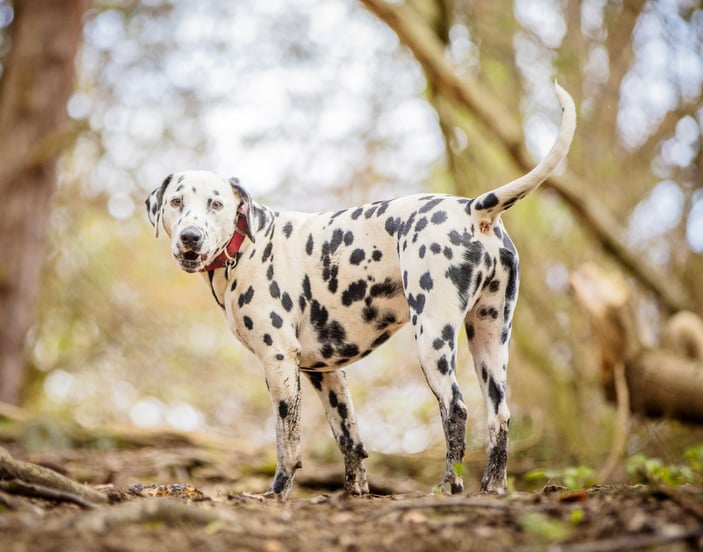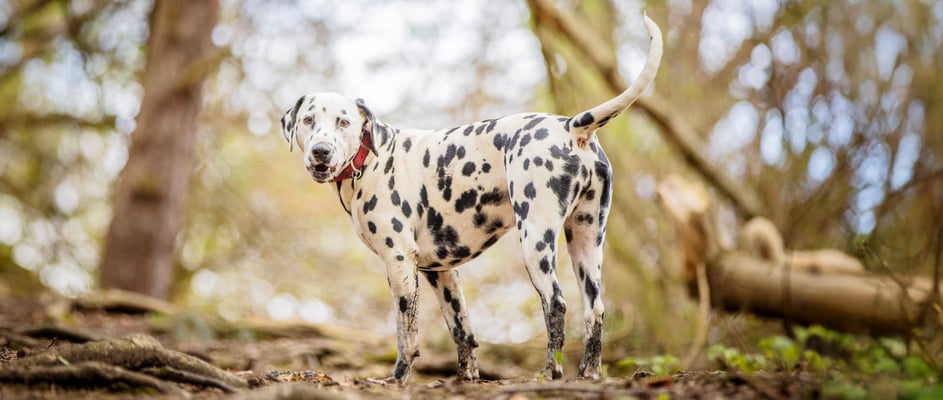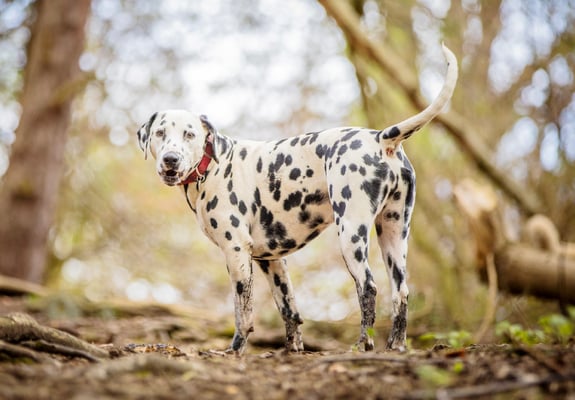The guide to owning a Dalmatian.
Want to know everything there is to know about training your Dalmatian puppy? Submit your email below, and we’ll send you a one-stop guide on all things puppy training!
Jump to:
Stats at a glance.
History of the Dalmatian.
Say hello to the Dalmatian, a breed of dog that’s instantly recognisable thanks to its iconic spotted coat.
Although it’s hard to pin down the exact origins of the breed, many believe they hail from the region of Dalmatia (in modern-day Croatia).
Over the centuries, Dalmatians are known to have served as coach dog companions, watching over horse-drawn carriages and alerting travellers to any trouble.
They also guarded stables at night, a role that made them famous as firehouse mascots when horse-drawn fire engines were common.
Their popularity soared even higher thanks to stories like 101 Dalmatians by English novelist Dodie Smith, cementing their spot in doggy folklore.
Want to learn about other larger breeds in Britain? Check out our guide to big dog breeds in the UK for more insights.
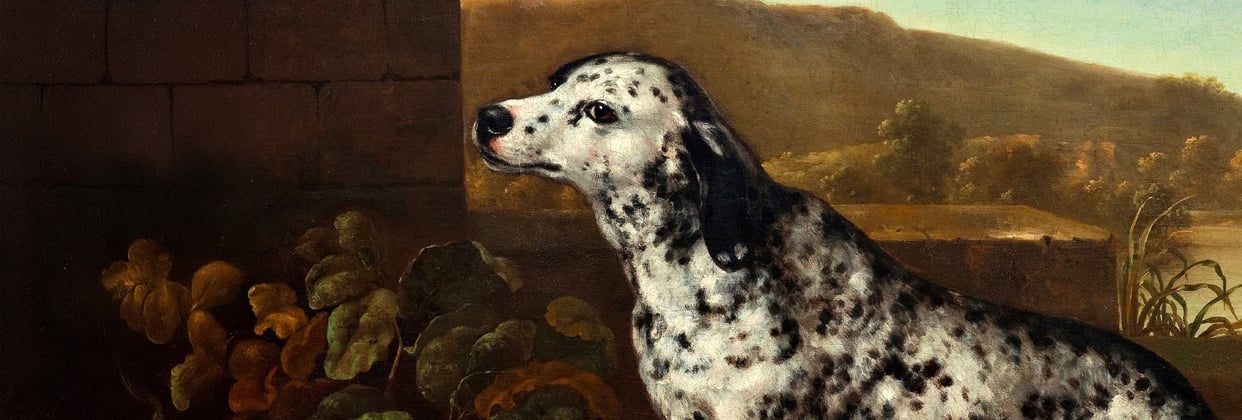

How much is a Dalmatian puppy (UK)?
The price of a Dalmatian puppy in the UK can vary quite a bit, but most range from £700 to £2,000, depending on factors like pedigree, breeding lines, and your pup’s coat colour (which can be black spotted or liver-spotted or even lemon-spotted). If you’re brand new to dog ownership, you might find it helpful to explore our puppy essentials guide to get ready.
Colours and coat types.
A Dalmatian dog generally has a sleek white coat decorated with eye-catching black or liver spots. Some lines may develop a heavier spotting pattern, while others stay sparse.
You might notice a combination of spots with white, liver & tan spots even two tone colourings.
Even though they may look extra fancy, their grooming needs aren’t overly complicated, they just need a routine once-over to keep them looking sharp.
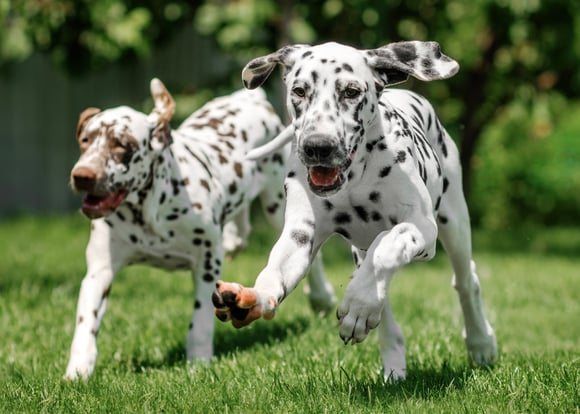
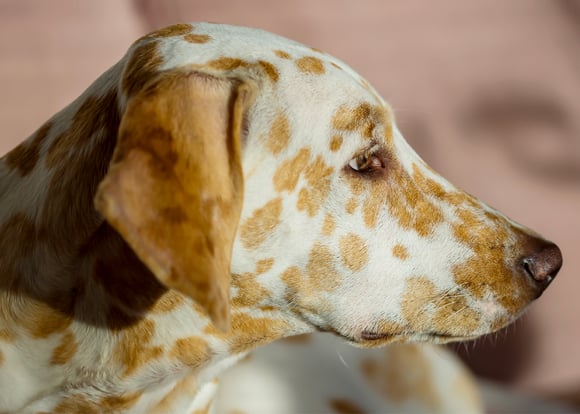
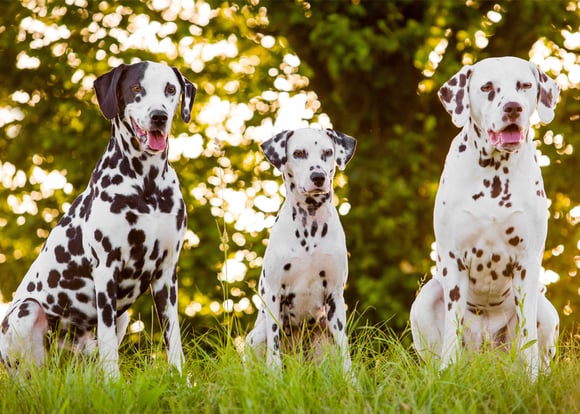
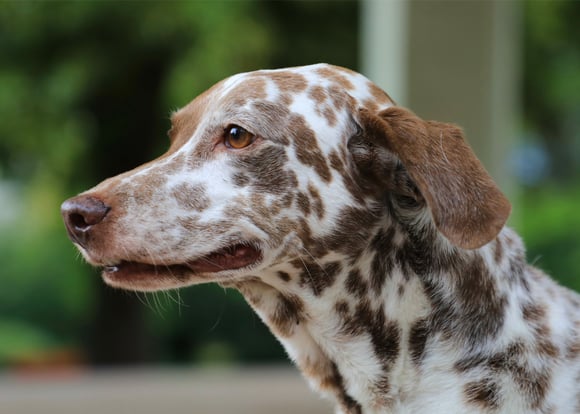
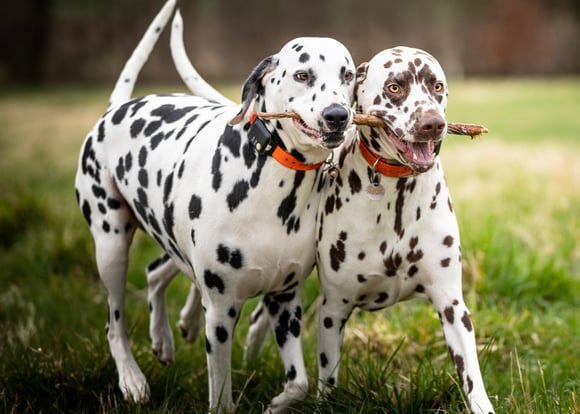
Size and weight.
A Dalmatian adult stands between 48cm and 61cm tall at the shoulder. Physically, these are agile athletes with sturdy frames ready to trot alongside you on a run. The average, healthy Dalmatian dog breed weighs around 20-32 kg, with individual body condition depending on diet and exercise.
Temperament and behaviour.
Are Dalmatians good with kids?
Most Dalmatians can be reserved at first, but with proper socialisation, they often do brilliantly with children. They thrive in active families, especially those who love adventurous outings.
We simply want to encourage gentle handling if you have younger children as their enthusiastic energy might knock over little ones if nobody’s supervising.
Are Dalmatians good with cats?
They can do well with feline friends if introduced carefully. Because some Dalmatians are often spirited and playful, we’d recommend slow, positive introductions. Teaching them good manners early on helps ensure harmony between species!
Do Dalmatians suffer from separation anxiety?
It’s not unusual for this breed of dog to get a bit anxious when left alone. They’re quite people-oriented. Hoping to avoid meltdown moments? Pop over to our dedicated guide on separation anxiety for tips.
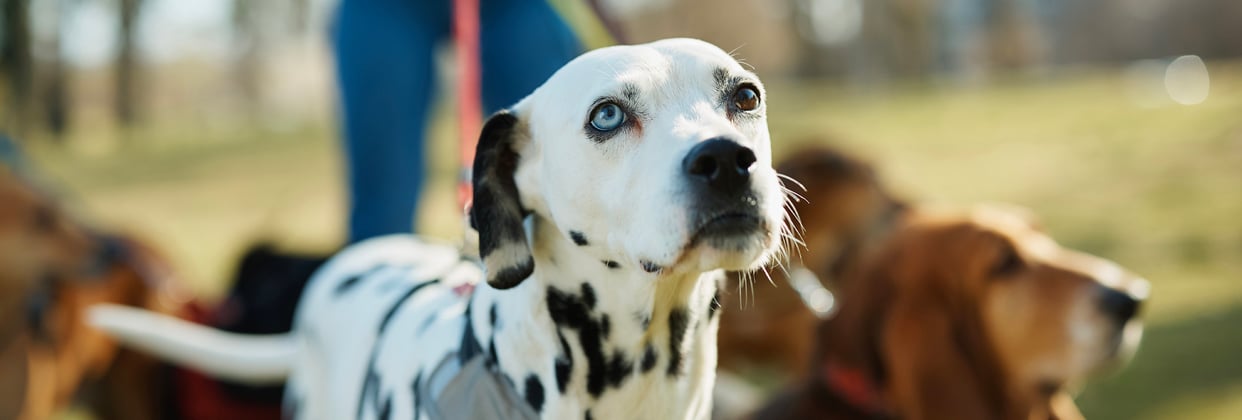

Can Dalmatians be left alone?
While they certainly long for human companionship, a Dalmatian was bred to run with carriages, meaning they can handle short stints solo if they’ve had enough exercise requirements. Still, like most dogs, they can become restless or destructive after long periods without company.
Can Dalmatians live in apartments?
They can adapt, but they’ll need plenty of daily walks and exercise needs met to keep that energetic spark channelled the right way. Access to safe outdoor areas for zoomies is a big bonus.
Do Dalmatians bark a lot?
They’re not known to bark excessively, although some can alert you when strangers pass by. Dalmatians can be reserved with strangers, so a little bark here and there is typically part of their watchdog side where they vocalise just enough to say “Who’s that?” rather than open the floodgates.
Training a Dalmatian.
Training a Dalmatian is all about finding the sweet spot between structure and fun. They thrive on clear guidance, but they’ll switch off if things get too repetitive.
Are Dalmatians smart?
Yes, indeed. Dalmatians are often quick learners, keen to problem-solve, and occasionally a tad stubborn. Like that friend who’s great at puzzles but tunes you out unless the treat bag rustles so motivation is key!
Positive, reward-based methods, short lessons, and patience go a long way. If your puppy stage is coming up, our how to bathe a dog resource offers grooming guidance, but it also includes tips for getting your pup comfortable with handling, an essential part of socialisation.
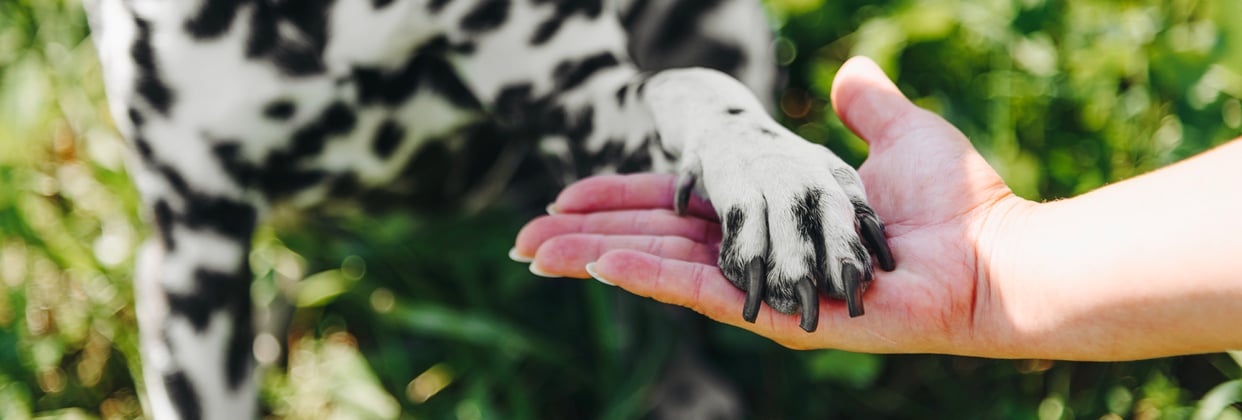

Shedding and grooming.
A common myth is that the Dalmatian coat is low-shedding. Surprise: they can actually shed year-round! Their short hairs can be a bit tricky to find until your sofa’s covered.
Frequent brushing and occasional baths using dog shampoos for itchy skin or sensitive coats may help. Aim for weekly brush sessions, sometimes more during heavy seasonal shed.
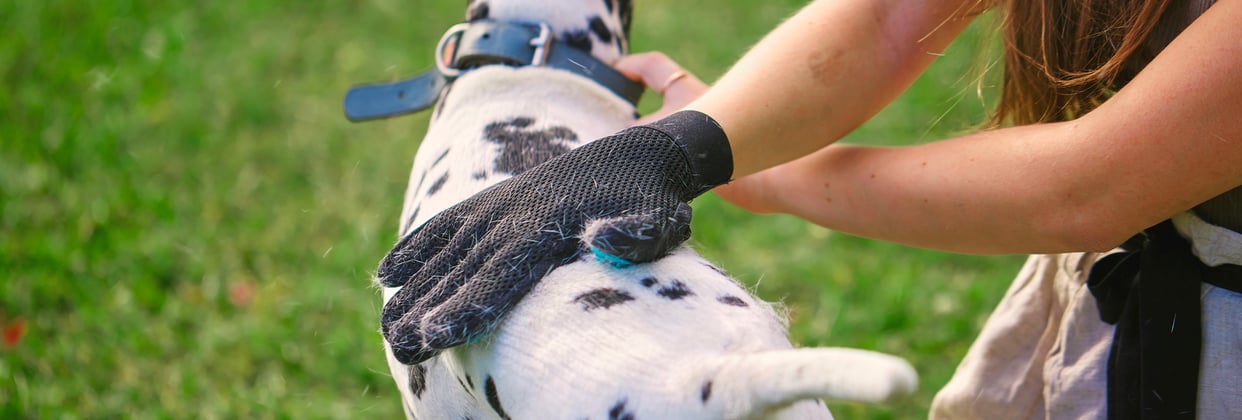

Exercise and mental stimulation.
If your dream is a couch potato companion, a Dalmatian might not be your best bet. This dog breed was originally bred for stamina and can go the distance so think jogging, hiking, or even advanced dog sports like agility.
Give them around 60-90 minutes of daily movement, broken into segments: a morning walk, an afternoon run, and some fetch or puzzle games in the evening.
You might notice them get antsy or hyperactive without these outlets.
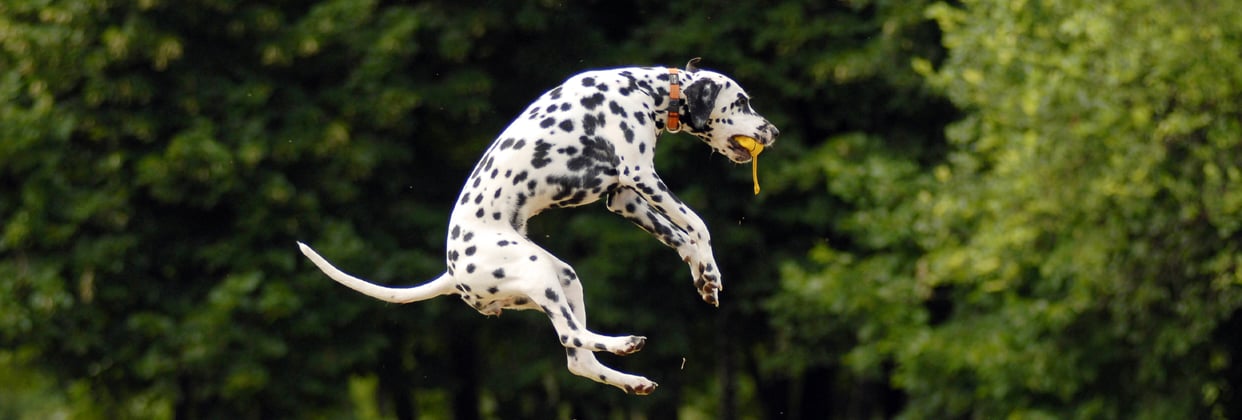

Feeding and nutrition.
To maintain a healthy body condition, a Dalmatian typically needs a balanced diet suitable for medium-to-large active dogs.
Some Dalmatians need special care to keep their uric acid levels in check, as they’re prone to forming kidney stones or urate crystals.
Chat with your vet about low-purine brands or specialised diets if you’re concerned.
Split meals into two servings a day, portioned based on activity. Keeping them at a healthy weight supports those lively runs in the park.
Common health concerns.
Below is a quick look at potential concerns, along with approximate UK treatment costs:
Note: Costs are approximate and can vary based on location and specific veterinary practices.
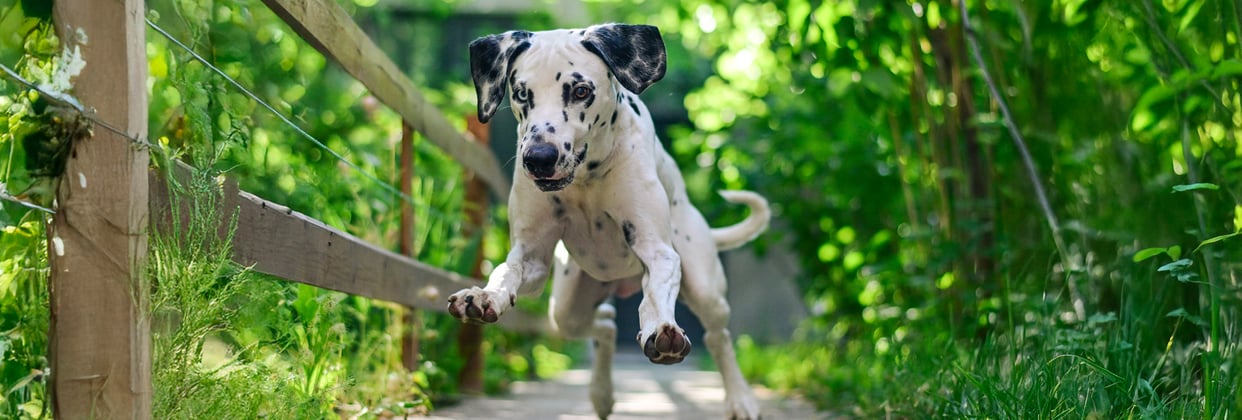

Pet insurance for Dalmatians.
Because Dalmatians can be at risk for breed-specific issues like deafness or kidney stones, it’s wise to look into comprehensive cover.
At Waggel, we’re all about safeguarding your beloved spotted dog with Lifetime coverage for chronic conditions, plus 24/7 online vet support. Get a feel for what we can do for you at our Dalmatian Pet Insurance page.
We know it’s a journey caring for such a spirited, lovable companion. The Dalmatian may have aristocratic roots in the regency period, but they’ll love your sofa (and your heart) just as much as any modern pooch.
With the right commitment to socialisation, training, and healthcare, your Dalmatian dog will be your proud friend for years to come.
